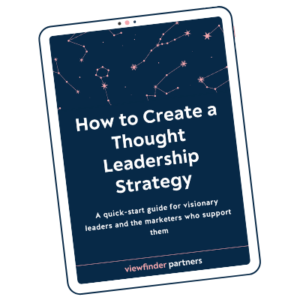What are the words that you remember people by?
I’m talking about the catchphrases that live on in your head. Certain reminders from the people who loom large in our lives.
We remember people by the core ideas they valued and shared. Especially the ideas that bubble up over and over.
So…when you think about your work, what are the words people remember you by?
What if you built a personal quote page, listing the simple ideas, unique perspectives, hot takes, and lines of questioning you’re known for?
What is a personal quote page?
I got this idea Pamela Slim’s Tiny Marketing Actions newsletter. Here’s her “recipe” for this tiny action:
- Gather your top quotes from books, blog posts, keynotes and social media.
- Organize them in useful, searchable categories.
- Create a page for them on your website
She was inspired to make a personal quote page as an SEO boon. If someone was searching for pearls of wisdom from her books or in her focus area, could they easily find her best-known quotes?
But I think this idea could be used as a broader thought exercise. Can you identify the 5-10 big ideas or quotable sayings you’re known for (or want to be known for)?
This is hard to do when you’re starting out cold. If you’ve never written about your work or spoken to a group about your area of expertise, this might feel like a giant question mark. But once you’ve slowly, consistently built a body of work through a thought leadership practice, scanning for patterns gets a lot easier.
Building my own quote page
I tried this thought experiment for myself this week.
What are the ideas I repeat over and over? I sat down to make my own personal quote page. First, I tried using AI to help. I asked ChatGPT:
Review the blog posts on my website, viewfinderpartners.com. Pull 10 of my most-repreated idea and make a list for a “quote page” for me.
AI didn’t do a perfect job answering my initial prompt, but it helped me get started in the right direction (and reminded me of some glaring holes it had missed: What about the thought leadership cycle? What about that framework I use in all of my slides?)
I kept adding and refining and ended up with a list of six big ideas.
Lee Price’s core thought leadership principles
- Developing your ideas is your most important work. Your ideas are your calling card. So make sure you are able to clearly communicate those ideas.
- Reflection comes first. Before you start sharing your ideas, take time to reflect on your expertise, perspective, and vision.
- Take people along on your long, craggy road. If you’re just sharing ads and accolades (good news), you’re not developing thought leadership. Thought leadership goes deeper, and requires sharing your ideas, what influences your work, and the long journey you took to arrive at the shiny final product.
- Stand at the top of your mountain and share your expertise, perspective, and vision. Stuck on what to share? Mine your expertise (what you learned from climbing that mountain), your perspective (what you can see clearly now from the top) and your vision (what’s coming on the horizon).
- Thought leadership is generous. Thought leadership isn’t a performance, and it’s not just for people on an ego trip. It’s generously letting people in on your thinking process.
- Thought leadership is a cycle that helps you get better at what you do. To benefit from that cycle, just follow three steps: Work. Reflect. Think in public. Use that reflection and sharing to make your core work better. (Repeat.)
Why you need a quote page
Creating a simplified shortlist of your best ideas has a lot of benefits. When you onboard a new team member or hire a contractor, you can point them to your quote page for a 101 view of how you think and what you want to be known for. When you’re asked to speak or write an article, you can go to your quote page for inspiration on the topic. When you’re preparing for a podcast conversation or media interview, your quote page can serve as a quick cheat sheet for the ideas you want to cover.
Try this exercise: Take 30 minutes and make your own list of quotes you want to be known for. What are the big ideas and simple lessons people will remember you by?
If you’re not known for your ideas already, make an aspirational quote page of the ideas you’d like to develop and share. Then look back in 6 or 12 months to reflect on the progress you’ve made.
Sometimes the simplest exercises are the most useful, and this one has been a help to me — I hope it helps you, too.







